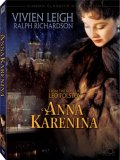| Reviews & Columns |
|
Reviews DVD TV on DVD Blu-ray 4K UHD International DVDs In Theaters Reviews by Studio Video Games Features Collector Series DVDs Easter Egg Database Interviews DVD Talk Radio Feature Articles Columns Anime Talk DVD Savant Horror DVDs The M.O.D. Squad Art House HD Talk Silent DVD
|
DVD Talk Forum |
|
|
| Resources |
|
DVD Price Search Customer Service #'s RCE Info Links |
|
Columns
|
|
|
Anna Karenina (1948)
Beautifully restored for DVD, and packaged with several nice bonuses, 20th Century-Fox has released, under their Cinema Classics Collection banner, the 1948 version of Leo Tolstoy's romantic tragedy, Anna Karenina, starring the incandescent Vivien Leigh and Ralph Richardson. Produced by the legendary British filmmaker Alexander Korda, and directed by Julien Duvivier, Anna Karenina has atmosphere to spare, with the beginnings of an intriguing central performance by Leigh. But this turgid rendition fails to ever achieve lift-off, and remains a lesser adaptation of the celebrated novel.

Back in September, I reviewed the 1967 Russian film version of Tolstoy's most popular novel (please click here to read that review), and I've seen the Greta Garbo version several times over the years. This particular version of Anna Karenina was new to me, and with the pedigree of some of the behind-the-scenes personnel involved, I certainly was looking forward to viewing it. It goes without saying that major portions of the Tolstoy novel are left out of this British production (as they are with the other versions, as well), but it stays fairly close to the original, at least in terms of plot lines. Unfortunately, at 112 minutes, Anna Karenina more than outstays its welcome, with a plethora of beautifully designed sets and costumes, carefully lit and imaginative shot, failing to mask the essential emptiness of this production's conception. Taken as decorous romantic tragedy, Anna Karenina plays well enough as a standard tearjerker. But any aspirations to cinematic greatness - which are insistently evident - fail.
Anna Karenina (Vivien Leigh) is married to Alexei Karenin (Ralph Richardson), a cold, constipated politician more interested in his career than in satisfying the emotional needs of his wife. Called back to Moscow by her brother Stefan Oblonsky (Hugh Dempster), a reprobate who has cheated on his trusting wife Dolly (Mary Kerridge) for the last time, Anna meets Countess Vronsky (Helen Haye) on the night train. They discuss their sons, with the Countess showing Anna a picture of her son, Count Vronsky (Kieron Moore). Vronsky shows up at the train to meet his mother, and is instantly infatuated with Anna. He baldly makes his interest known to her, which Anna demurely pushes away - but not emphatically so. At a fancy ball, Vronsky continues to pursue the married Anna, much to the delight of the gossiping socialites. But poor Kitty Scherbatsky (Sally Ann Howes), who is smitten with Vronsky, is humiliated by his behavior and leaves the ball - much to the distress of Konstantin Levin (Niall MacGinnis), a suitor of Kitty's who was rejected by her in favor of Vronsky.
Boldly following Anna back to St. Petersburg, Vronsky makes it known to society that he is the consort of Anna - a notion she does nothing to stop. Soon, society is whispering about the affair, and it's only a matter of time before Alexei learns of the relationship. More worried about his social and political position rather than his wife's passion, he orders her to break off with Vronsky, or risk losing her son. She tries, but cannot tear herself away from Vronsky. Leaving Alexei, Anna becomes pregnant with Vronsky's child. Almost dying in childbirth (the child is still born), Anna begs Alexei for forgiveness, which he coldly grants. Alexei, being magnanimous, allows Vronsky the notion that he may visit Anna if she calls for him. Embarrassed by the scandal, Vronsky tries to kill himself, and fails. Anna tries again to live with Alexei, but cannot get Vronsky out of her head. She leaves Alexei for good, abandoning her child to live in Italy with Vronsky. But her doubts over Vronsky's feelings for her grow, and she eventually pushes him away. Realizing that she has lost everything, Anna walks the train tracks, and commits suicide.
The production design for Anna Karenina is quite sumptuous, with art direction by Andrej Andrejew (The Golem, Anastasia), cinematography by Henri Alekan (Roman Holiday), and costumes by the famed Cecil Beaton. Director Duvivier, a legend in pre-war French cinema, manages at times to evoke a suitably mysterious, existential "Russian" atmosphere to the proceedings (Anna's creepy dream sequences where she anticipates her death, her powerhouse final death sequence), while maintaining an emphasis on spectacle when needed (the ball sequence). Where Anna Karenina fails to register is in the actual romantic triangle of the story. Since producer Korda eliminates most of the social commentary of the novel, along with the mystical depths of Tolstoy's reveries on god, man, and politics, Anna Karenina must remain a hyped-up tearjerker. And for that kind of film to succeed, we need a believable triangle.
It's certainly not the fault of the main actors. Leigh again proves that there's something almost supernatural in her ability to channel even the faintest of emotions in a direct circuit-cable line to the audience. A supremely empathetic performer, she's unfortunately saddled here with a character the audiences rarely feels any sympathy for. Certainly, her cold, heartless husband (expertly essayed by Richardson) would indicate that Anna deserves personal happiness. However, the fact that she leaves her son who loves her desperately always leaves audiences and readers cold towards Anna, further exacerbated by the fact that she ruins her life for such a worthless character as Vronsky. Moore, handsome, oily and callow in the role, perfectly embodies the worthless Vronsky, but for some strange reason, director Duvivier keeps insisting on celebrating these two selfish characters' love affair, with swelling, affirmative music coming up on the soundtrack whenever they're together. It's certainly against the intentions of Tolstoy to give these lovers a pass, and the screenplay does little to counter that intention and honor the director's wish to celebrate them. Not enough play is given to the lovers' initial interaction. We're basically just told they're infatuated with each other, and that's that. We never really feel it, or see it on the screen. Somehow we're supposed to be witnessing a great love affair, but often times, it feels abbreviated and forced. And without a believable erotic charge, or overriding passion squashing out reason, such a love affair as Korda's Anna Karenina comes off as pretty pictures in service of a long, cliched tale, and not the cinematic classic that was clearly intended.

The DVD:
The Video:
Much care has been taken by 20th Century-Fox to restore the print used here for the DVD release. A film restoration comparison is included on the disc, showing just how improved the picture is, after careful digital enhancement. That being said, the full-frame video image for Anna Karenina is quite nice, with the velvety, shadowy black and white cinematography looking fairly spectacular.
The Audio:
You can listen to Anna Karenina either in a new Dolby Digital English 2.0 stereo version, or in the original English mono (I always prefer to listen to the film the way it was originally intended). There's also a Spanish mono language track included, as well. Subtitles are available in English, Spanish and French. Close-captioning is also available.
The Extras:
There are quite a few nice extras for this 20th Century-Fox Cinema Classics Collection DVD edition. First, there's a wonderful 30 minute documentary, Tolstoy: The Man Behind Anna, written and directed by John Cork, that is must-viewing prior to watching the film. Less important, but still entertaining, there's a short, six minute featurette, The Tolstoy Legacy, that discusses the ramifications of Tolstoy's work on world history. Next, there's a film comparison short that illustrates the miraculous job 20th Century Fox did in restoring this beautiful-looking film. And finally, there's a still gallery for the film. Inside the DVD box, you'll find an informative two page booklet that gives some production background on the film, along with four, 6 x 4 ½ lobby card reproductions from the original promotional campaign.
Final Thoughts:
Beautiful to look at, with some imaginative touches to the direction, Anna Karenina would seem a sure-fire adaptation of Tolstoy's famous novel of adultery and social criticism. But a miscast Leigh, along with a constipated production that emphasizes looks over content, drags this superficial, thinly scripted version into cliched romance novel territory. Rent it for the costumes, the cinematography, and for Leigh's aborted performance.
Paul Mavis is an internationally published film and television historian, a member of the Online Film Critics Society, and the author of The Espionage Filmography.


|
| Popular Reviews |
| Sponsored Links |
|
|
| Sponsored Links |
|
|
| Release List | Reviews | Shop | Newsletter | Forum | DVD Giveaways | Blu-Ray | Advertise |
|
Copyright 2024 DVDTalk.com All Rights Reserved. Legal Info, Privacy Policy, Terms of Use,
Manage Preferences,
Your Privacy Choices | |||||||













